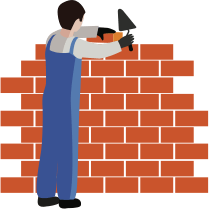Through our experienced supplier partners, Inspacco provides civil work and repair services to residential gated communities.
Get in touch with us and see how you can utilise it for your community.

- We specialise in brick work, stone masonry, compound walls, cladding on walls, plastering (external and internal), and more.
- Starting anywhere from the foundation to the finish, we deliver quality workmanship and reliability at a reasonable cost.
- Inspacco ensures quality with our efficient team, overseeing all projects with hands-on daily site management with attention to detail and budgets.
Frequently Asked Questions
What do you mean by masonry?
Masonry is the building of structures from individual units, which are often laid in and bound together by mortar; the term masonry can also refer to the units themselves.
What are the various types of masonry walls?
Following are the types of masonry walls in building constructions: Load Bearing Masonry Walls -Load bearing masonry walls are constructed with bricks, stones or concrete blocks. Reinforced Masonry Walls- Reinforced masonry walls can be load bearing walls or non-load bearing walls. Hollow Masonry Walls- A brick or concrete block that is less than 75 percent solid in the plane that rests in the mortar bed Composite Masonry Walls - These walls are constructed with two or more units such as stones or bricks and hollow bricks. This type of masonry wall construction is done for better appearance with economy. In composite masonry walls, two wythes of masonry units are constructed bonding with each other. Post-tensioned Masonry Walls - It is used to offset the tensile stress experienced under service conditions by introducing a level of precompression into the member.
What kinds of projects can masonry construction cover?
Masonry projects can scale from simple mortar replacement to structural reinforcement or even full wall builds. At Inspacco we can handle an array of masonry construction projects, including brick work, block work, additions, kitchens, fireplaces, fire pits, garden paths, walkways, benches,chimneys, tuck pointing and much more
What is thin stone veneer?
Thin stone veneer is real natural stone that is quarried and then manufactured. It is cut down into thin pieces of stone that only show the natural “Face” of the stone. The finished thickness of the stone after manufacturing it varies from 1 inch to about 2 inches
What is the difference between thin brick and regular brick?
Thin brick is actually a regular brick that has been cut down to a thickness of approximately 3/4 of an inch. Some manufacturers actually produce thin brick by making molds and then pouring a mixture of materials that are later set into a kiln to dry for a period of time. With the lightweight advantage thin brick can be installed in numerous places where regular brick can not. Regular brick requires some type of footing or support to be constructed on and is typically used outside of a home or commercial building. Regular brick is more durable in comparison to thin brick simply because it is thicker.
What can I expect during the masonry project?
After we go through the details of the assigned project, we create a detailed contract and production schedule. Once our crew begins to work on that project, regardless of its scale, we will keep you updated every step along the way. The time of executing the project will also depend on the estimation we will do during the primary inspection.